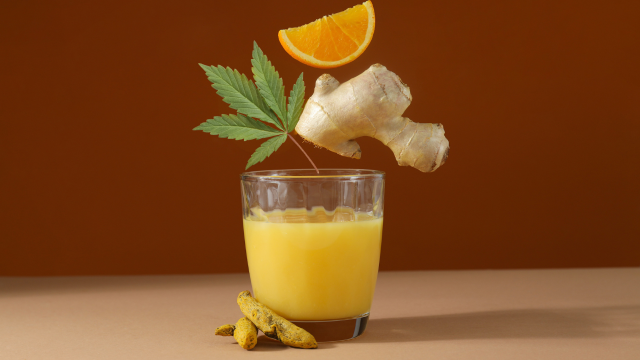Are you at least 21 years of age or hold a valid medical marijuana card?
Daily Specials
{{ special.title }}
{{ special.description }}
*{{ note }}EARTHMED BLOG

Does Weed Lower Your Immune System?

Even people who don’t smoke weed have a general sense of how cannabis affects the user’s brain. But how does weed affect your body? Whether you’re using cannabis casually or for a medical condition, it’s worth knowing how it might help or hinder your immune system. Let’s dive into how cannabis interacts with our body’s natural defenses.
Does Weed Lower Your Immune System?
Unfortunately, the answer isn’t so simple. As your body’s defense network, your immune system helps you fight off viruses, bacteria, and other harmful invaders while also repairing tissues and removing damaged cells. Fruits and vegetables, rich in vitamins and antioxidants, typically help boost immune function. In contrast, processed foods, excessive alcohol consumption, and insufficient sleep can weaken the immune system, making the body more vulnerable to infections.
To understand how weed affects the immune system, it’s important to keep in mind that cannabis can come in many different shapes (and plants) with many different chemical compositions. Weed is composed of a variety of different cannabinoids, terpenes, flavonoids, and other compounds that each interact with the body in distinct ways. This ultimately means that different cannabis strains will have unique effects on the human body.
THC vs. CBD
The two most well-known cannabinoids are THC (tetrahydrocannabinol) and CBD (cannabidiol), and when it comes to immune system health, they’re also the two most frequently studied. There are over 100 cannabinoids, such as CBN and CBC, which likely have somewhat differing effects on our immune systems, but the research isn’t as robust at this point. Nevertheless, research suggests that THC and CBD have different (sometimes opposite) effects on the immune system.
One of the most widely recognized effects of CBD on immune health is its anti-inflammatory properties, which have been observed in consumers. For years, countless individuals with conditions such as arthritis and multiple sclerosis have relied on CBD products to manage their symptoms. According to a recent study, CBD appears to modulate the immune system by decreasing the production of pro-inflammatory cytokines and reducing the migration of immune cells to areas of inflammation. While research is still ongoing, the evidence to date suggests that CBD has potential as a natural modulator of inflammation.
Both THC and CBD have anti-inflammatory effects, but CBD is generally considered more effective. On the other hand, THC acts as an immunosuppressant, meaning it can dampen the immune system’s response. When THC binds to CB2 receptors, part of the endocannabinoid system, it begins to suppress immune cell activity, which is one way to help calm an overactive immune system. This can help manage the symptoms of autoimmune conditions, such as rheumatoid arthritis (RA) and lupus. Please note that immunosuppressants temporarily suppress the immune system, making the body more susceptible to infections and illnesses.
The Effects of Terpenes
Terpenes, the aromatic compounds found in cannabis, can also have an effect on the immune system. Recent research has shown that terpenes themselves, rather than just the cannabinoids, have been shown to reduce inflammation, potentially supporting the immune system in ways similar to CBD. This can be especially notable when you’re searching for a new strain to help treat your underlying medical condition.
Some terpenes, like limonene, can act as antioxidants, protecting you from damage caused by free radical cells. Another terpene, Caryophyllene, is capable of binding to CB2 receptors, just like cannabinoids, and inhibiting inflammation throughout the body. Other terpenes, such as linalool and pinene, have also demonstrated anti-inflammatory and immune-regulating effects in early studies.
While much of the research on terpenes and the immune system is still in its early stages, it’s exciting to see more about their role in enhancing and balancing immune responses. If you're considering cannabis for medicinal reasons, try to pay attention to terpene profiles in addition to THC and CBD levels to help find strains that best suit your needs.
Virus Response
While cannabis can be a big help for stimulating appetite and fighting inflammation, it can technically have a negative effect on your immune system when it comes to a viral response. As mentioned before, THC can dampen the body's ability to mount a strong viral immune response, largely due to its immunosuppressive properties. T cells are usually key players in killing virus-infected cells. However, THC has been shown to reduce both the number and function of these cells in some animal studies. This suppression may slow down your body’s initial immune response to viral threats.
Just keep in mind that your THC dosage, frequency of use, and general health status will also affect your immune system’s ability to fight viral infections. Occasional or low-dose use might have negligible effects in healthy individuals, while chronic heavy use could have more noticeable impacts.
Cannabis is widely known for its effects on the brain, but its impact on the immune system is just as complex. For the most part, marijuana can either suppress or modulate the immune system, depending on the cannabinoids involved. Still, it’s important to note that the research is still in its early stages. While results are promising, more human-based research is needed to fully understand how cannabis affects the immune system. Nevertheless, if consumed in moderation (or isolation), you can probably enjoy the benefits of THC and CBD products without fear of getting a viral infection.
Do you notice cannabis having an impact on your immune system? Hit me up on social media, and let’s spark up a conversation about it!
{{ locations[0].name }}
{{ locations[0].address }}{{ locations[0].city }}, {{ locations[0].state }} {{ locations[0].zip }}
{{ locations[0].phone }}
Hours
Sun: {{ locations[0].hours_recreational.Sunday }}Mon: {{ locations[0].hours_recreational.Monday }}
Tue: {{ locations[0].hours_recreational.Tuesday }}
Wed: {{ locations[0].hours_recreational.Wednesday }}
Thu: {{ locations[0].hours_recreational.Thursday }}
Fri: {{ locations[0].hours_recreational.Friday }}
Sat: {{ locations[0].hours_recreational.Saturday }}
{{ locations[1].name }}
{{ locations[1].address }}{{ locations[1].city }}, {{ locations[1].state }} {{ locations[1].zip }}
{{ locations[1].phone }}
Hours
Sun: {{ locations[1].hours_recreational.Sunday }}Mon: {{ locations[1].hours_recreational.Monday }}
Tue: {{ locations[1].hours_recreational.Tuesday }}
Wed: {{ locations[1].hours_recreational.Wednesday }}
Thu: {{ locations[1].hours_recreational.Thursday }}
Fri: {{ locations[1].hours_recreational.Friday }}
Sat: {{ locations[1].hours_recreational.Saturday }}






